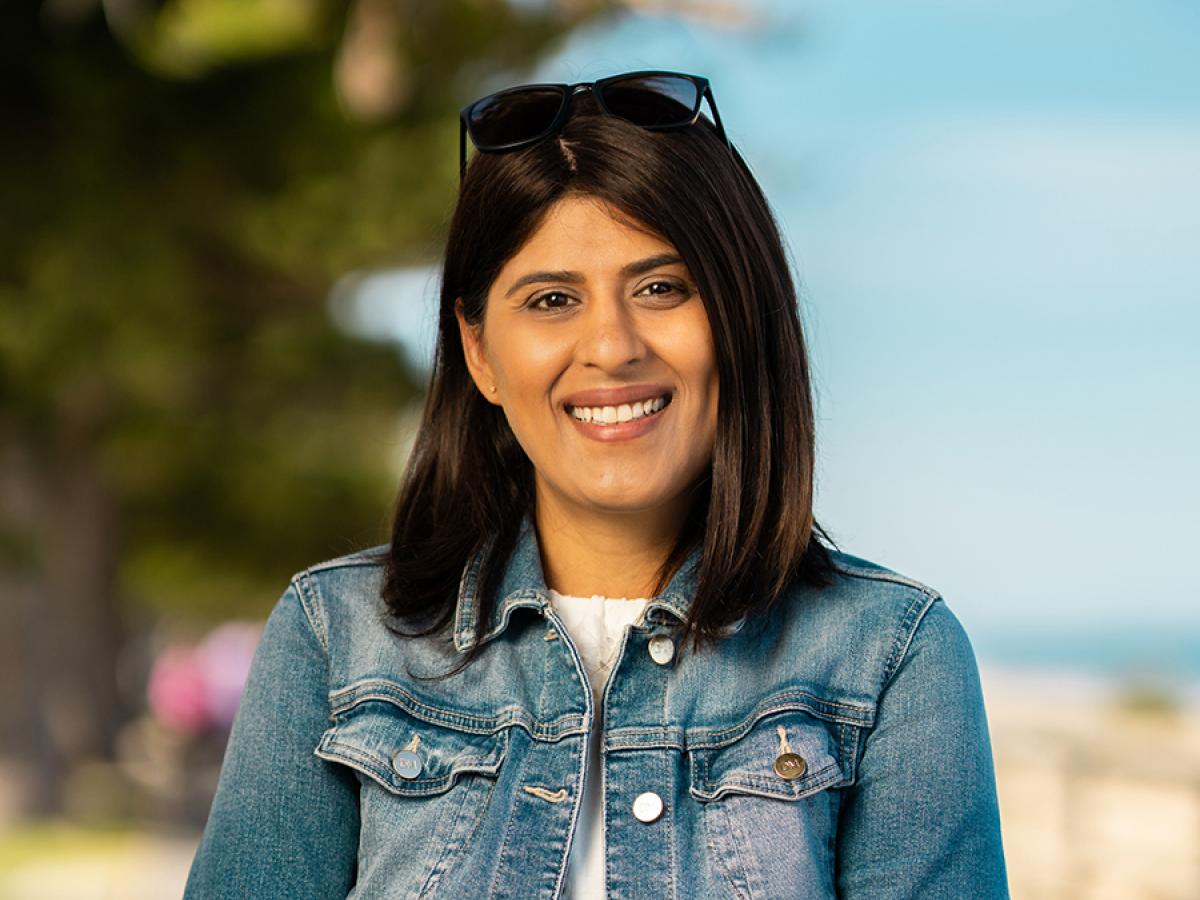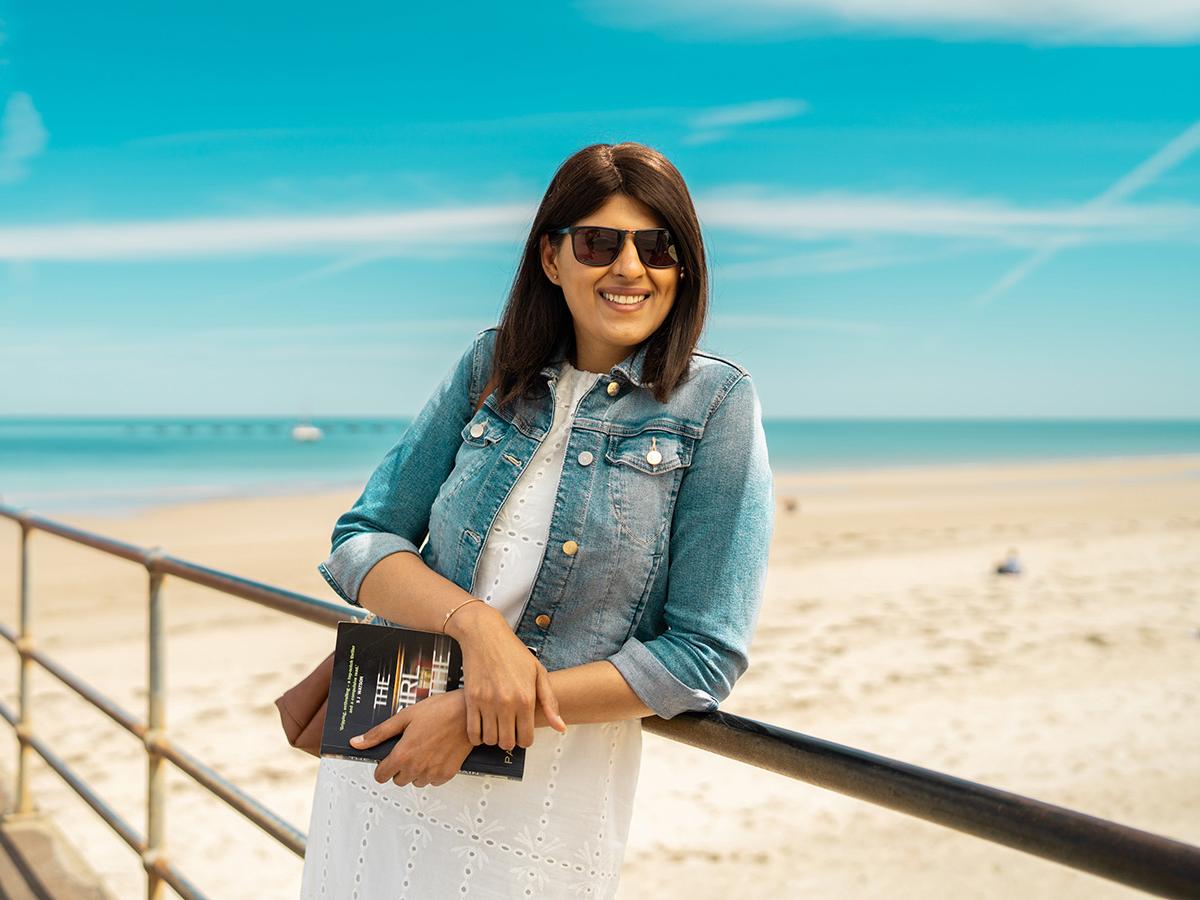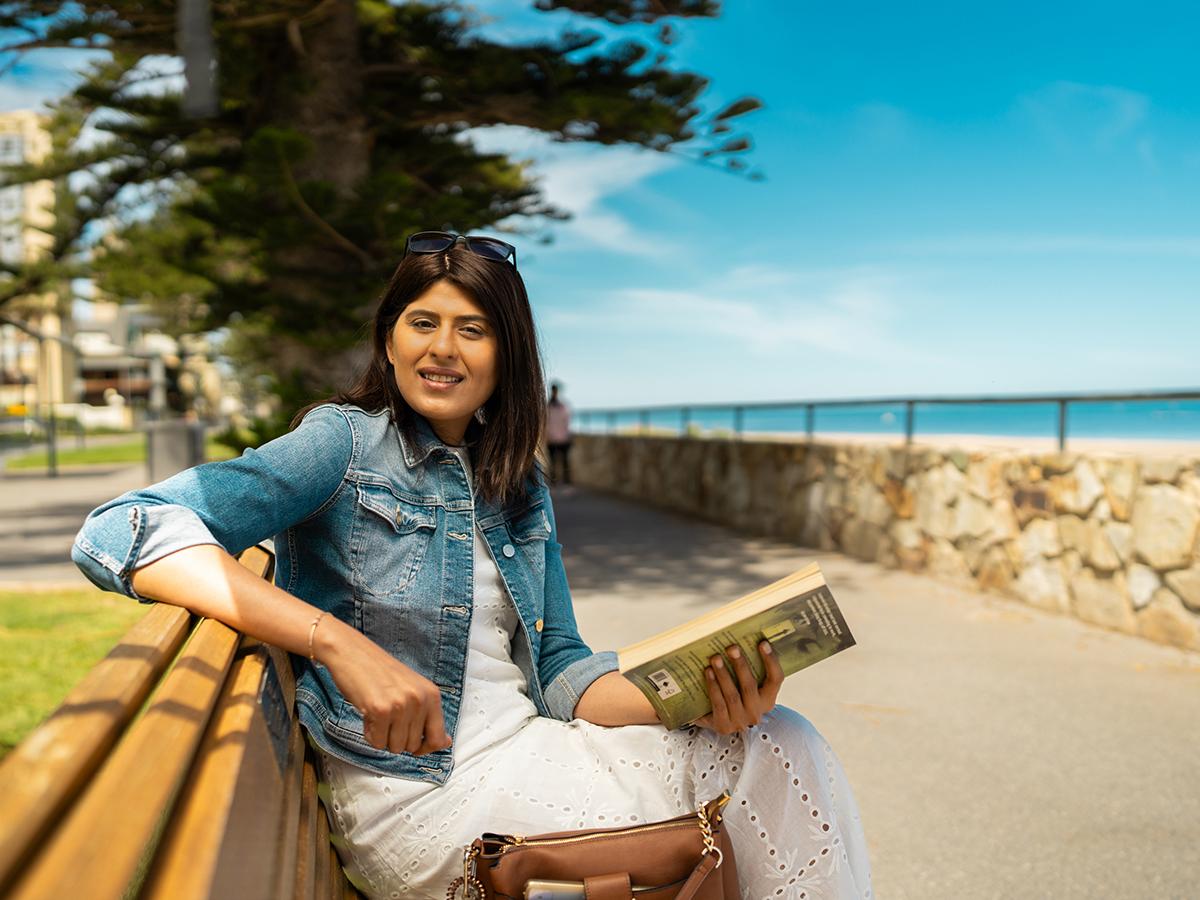Connected Conversations | Zohra Lassi
From her early days in research, when she took a research position studying the community-based maternal and newborn packages in Pakistan, Zohra Lassi has been driven to help those who need it most. Her early experience sparked a passion for research that not only shapes global health guidelines but has the power to transform entire communities.

Today, as Associate Professor at the Robinson Research Institute and the School of Public Health, Zohra’s focus is on enhancing adolescent sexual and reproductive health. With contributions adopted by the World Health Organisation, a slew of prestigious awards to her name, and recognition as one of the world’s top 2% of most cited scientists, there’s no doubt her work is making an impact. Beyond her professional accomplishments, Zohra finds an outlet in creative pursuits such as painting, sketching and even aspiring fashion vlogging on YouTube.
Please tell us your name and a little bit about yourself.
Hello, I'm Zohra Lassi, and I've dedicated my career to epidemiology and global public health. As an NHMRC Emerging Leader (EL2) Fellow and an Associate Professor at the Robinson Research Institute and the School of Public Health at the University, I've had the privilege of making a meaningful impact on public health. I've also been fortunate to receive some prestigious awards along the way. In 2011, I was awarded the Kenneth Warren Prize from Cochrane for my meticulous work on a high-quality systematic review. In 2021, I received the Women's Excellence in Research Award from 'Healthy Development Adelaide,' an acknowledgment of my contributions to promoting women in science. In the same year, I was honoured as a joint awardee of the International Episteme Laureate by Sigma Nursing.
My current research focus is on enhancing the health of adolescents, particularly in the realm of sexual and reproductive health. To achieve this, I employ a wide range of research methods, including evidence synthesis, quantitative and qualitative surveys, and the analysis of extensive datasets from both national and international sources. I'm especially excited about the possibilities that implementation science offers in reshaping adolescent health outcomes. One of the most fulfilling aspects of my work is my collaboration with the World Health Organization. Together, we're working to understand and improve contraceptive use among young adults, with an emphasis on strengthening agency and empowerment. This partnership allows us to develop more informed and effective public health strategies that can benefit young people worldwide. In 2022, I was honoured to receive the SA Young Tall Poppy Science Award, recognizing my contributions as a rising star in the world of science.
I'm proud to be internationally recognized for my research, which focuses on improving reproductive, maternal, newborn, child, and adolescent health and nutrition (RMNCAH&N) in disadvantaged settings. What drives me is not just conducting research but translating it into practical global health guidelines and policies. In fact, my work has led to the adoption of six of my contributions by the World Health Organization (WHO). With over 200 peer-reviewed papers under my belt, I've become a trusted source of knowledge in my field. In 2022, I had the honour of joining the top 2% of the most cited global scientists according to the AD Scientific Index, which was a humbling recognition of the impact of my work.

What was your first area of study and what drew you to this space?
My journey into the world of research and public health began with a profound desire to make a difference in the lives of those who needed it most. It all started during my Master's program, where my first area of research was dedicated to understanding the mental health of children living in orphanages.
After completing my Master's studies, I took a significant step forward by joining the Department of Pediatrics at the Aga Khan University in Pakistan. Here, I became part of a dedicated team focused on maternal and child health projects. Our mission was clear: to improve the health of mothers and babies in the country's poorest and most underprivileged regions. Working alongside this remarkable group, I was exposed to a world of challenges and opportunities. Our projects were diverse and impactful, addressing critical maternal and child health issues. This work not only deepened my understanding of the complex web of factors affecting the well-being of mothers and infants but also ignited a passion for research that could truly transform communities.
The stark realities faced by these underprivileged communities fuelled my commitment to making a tangible difference. I realised that research held the key to unlocking innovative solutions and interventions that could save lives and enhance the overall health of these vulnerable populations.
What has been your journey to get where you are today?
My journey to this point in my career has been a dynamic and evolving adventure, marked by intentional diversions and unexpected detours. One significant detour was the move from Pakistan to Australia, which added a new layer of complexity to my professional path.
Leaving Pakistan and establishing myself in Australia was pivotal in my journey. It brought with it a profound shift in perspective and a new focus on addressing the health needs of disadvantaged and underprivileged communities in Pakistan and my newfound home, Australia. This transition allowed me to see firsthand the unique challenges and opportunities within Australia's diverse and multicultural landscape. I realised that my expertise in public health and my passion for making a difference could also extend to improving the lives of marginalised communities in my adopted country.

What are you working on now?
My journey in the realm of public health has been a dynamic and purpose-driven one. Currently, I focus on improving the health and well-being of underprivileged and disadvantaged adolescents and young people in Australia. In my current role, I've set my sights on addressing a pressing issue—sexual and reproductive health. It's an area of concern that touches the lives of countless young individuals, particularly those from migrant and refugee backgrounds. The challenges they face are multifaceted, including cultural barriers, limited healthcare access, and knowledge gaps about preconception health.
My passion for creating health equality in Australia drives my commitment to this area of research. I firmly believe that everyone, regardless of their background or circumstances, deserves access to the same level of care and support when it comes to their health, especially in matters as crucial as sexual and reproductive health. Working diligently with these disadvantaged communities, I aim to break barriers, provide education and resources, and empower young individuals to take control of their health. My ultimate vision is to contribute to a society where health disparities are a thing of the past, and where every adolescent, regardless of their background, has the knowledge and resources to make informed choices about their sexual and reproductive health.
What do you love most about working at the University of Adelaide?
Working at the University of Adelaide has been an incredibly rewarding and enriching experience. There are several aspects of my role here that I hold dear, but if I had to choose what I love most, it would be the opportunity to make a meaningful impact. The best part of my job is the platform it provides to effect positive change in the field of public health. The university serves as a dynamic hub of knowledge and innovation, enabling me to collaborate with brilliant minds and access cutting-edge resources. This environment empowers me to turn my research into tangible solutions that can improve the lives of individuals and communities locally and globally. Moreover, the University of Adelaide fosters a culture of collaboration and interdisciplinary work. This collaborative spirit is a constant source of inspiration, as I have the privilege of working alongside colleagues who share a passion for addressing complex health challenges. These partnerships open doors to fresh perspectives, innovative approaches, and the collective wisdom needed to tackle the most pressing public health issues. Another aspect I deeply appreciate is the University's commitment to diversity and inclusivity. It provides a supportive and inclusive space where I can engage with diverse voices, ideas, and experiences. This diversity fuels creativity and ensures that the solutions we develop are sensitive to the unique needs of the populations we serve.
What are some of the exciting developments or opportunities happening globally in your area of research?
The future of public health research involves developing strategies to mitigate these impacts and build resilience. Researchers are exploring the intersection of climate science and health to develop adaptive solutions, early warning systems, and sustainable healthcare practices. This includes initiatives like promoting urban green spaces, designing climate-resilient healthcare infrastructure, and advocating for climate and health policies. Looking ahead, the integration of AI and climate change considerations in public health research is a powerful synergy. AI can help model and predict the health effects of climate change, analyse large climate datasets, and develop innovative interventions to mitigate risks.
In summary, the future of public health research is shaped by cutting-edge technologies like AI and a growing awareness of the critical relationship between climate change and health. These developments offer unprecedented opportunities to not only understand and address health challenges but also to shape a healthier, more sustainable future for all proactively. It's a future where data-driven insights and innovative solutions play a pivotal role in safeguarding human well-being amidst a changing world.

What’s something that people are surprised to find out about you?
While my professional journey in public health may be well-known, some aspects of my life often surprise people when they discover them. One such facet is my passion for creativity and exploration beyond the world of academia and research. First and foremost, I am an aspiring YouTuber with a deep passion for fashion. Watching fashion vlogs and videos on YouTube is one of my most beloved pastimes. It's a space where creativity knows no bounds, and I find endless inspiration in the diverse fashion content available. From style tips and wardrobe hauls to behind-the-scenes glimpses into the fashion industry, these videos captivate my imagination and ignite my own fashion explorations.
Sketching and painting have always held a special place in my heart. These creative outlets offer a refreshing escape from the demands of my profession. Whether sketching intricate designs, experimenting with vibrant colours on canvas, or crafting unique handmade items, I find solace and inspiration in the art world.
What is one of the best decisions you have ever made?
Reflecting on my life's journey, one of the most impactful and fulfilling decisions I've ever made was choosing to pursue a career in public health. This decision has shaped my professional path and allowed me to make a meaningful difference in the lives of individuals and communities. Public health is a field that touches every aspect of society, from promoting well-being and preventing diseases to addressing health disparities and advocating for policy changes. It's a field driven by a deep sense of purpose—to improve all people's health and quality of life.
What is your favourite thing about living in Adelaide?
Living in Adelaide offers a unique blend of experiences, and there are several aspects of this beautiful city that I truly cherish. Here are a few of my favourite things about life in Adelaide:
- The serene natural beauty: Adelaide's lush green spaces, including the famous Adelaide Botanic Garden and the picturesque Adelaide Hills, provide a tranquil escape from the hustle and bustle of daily life. The city's proximity to stunning beaches, such as Glenelg and Henley Beach, is another highlight, offering opportunities for relaxation and outdoor activities. During my leisure time on weekends, I engage in strolls along Glenelg Beach, concurrently indulging in the exploration of local weekend markets in the vicinity.
- Culinary delights: For someone who enjoys subcontinent cuisine, Adelaide has a fantastic food scene with plenty of options to explore.
- Cultural diversity: Adelaide's multicultural fabric adds richness to its cultural scene. The city celebrates various cultural festivals and events throughout the year, showcasing the talents and traditions of its diverse communities.
What kind of difference would you like to make in the world?
I understand that the prospect of making a significant difference in the world can seem overwhelmingly ambitious. In my journey through public health and academia, my aspiration is to contribute to improving the well-being of individuals and communities, particularly those who are disadvantaged and vulnerable. While the path to achieving this goal may be long and complex, it's filled with opportunities to make a difference, even in small ways.
What do you do on your commute to/from work?
During my commute to and from work, I often use this time as an opportunity to catch up on my favourite YouTube videos. It's a wonderful way to make the most of this otherwise idle time and stay entertained or informed, depending on the content I choose to watch.
Follow Zohra on X: @ZohraLassi
